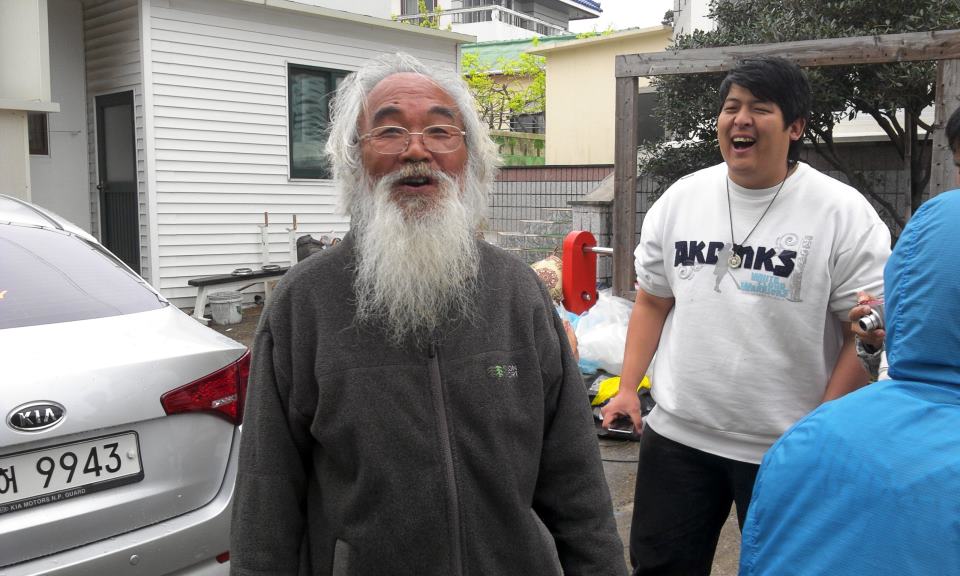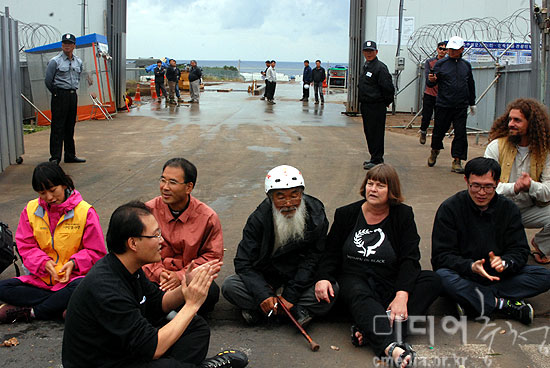Motion 181: Protection of the People, Nature, Culture and Heritage of Gangjeong Village
World Appeal to Protect the People, Nature, Culture and Heritage of Gangjeong Village
UNDERSTANDING that Gangjeong Village, also known as the Village of Water, on the island of Jeju, also known as Peace Island, is a coastal area home to thousands of species of plants and animals, lava rock freshwater tide pools (“Gureombi”), endangered soft coral reefs, freshwater springs, sacred natural sites, historic burial grounds, and nearly 2,000 indigenous villagers, including farmers, fishermen, and Haenyo women divers, that have lived sustainably with the surrounding marine and terrestrial environment for nearly 4000 years;
NOTING that Gangjeong Village is an Ecological Excellent Village (Ministry of Environment, ROK) of global, regional, national and local significance, sharing the island with a UNESCO designated Biosphere Reserve and Global Geological Park, and is in close proximity to three World Heritage Sites and numerous other protected areas;
NOTING that numerous endangered species live in and around Gangjeong Village, including the Boreal Digging Frog (Kaloula borealis) listed on IUCN’s Red List of Threatened Species; the red-footed crab (Sesarma intermedium); the endemic Jeju fresh water shrimp (Caridina denticulate keunbaei); and the nearly extinct Indo-Pacific bottlenose dolphins;
NOTING the global uniqueness of the Jeju Soft Coral habitats, designated as Natural Monument 422 of Korea: the only location in the world known to have temperate octocoral species forming a flourishing ecosystem on a substrate of andesite, providing ecological balance to the Jeju marine environment and the development of the human culture of Gangjeong Village for thousands of years;
UNDERSCORING that of the 50 coral species found in the Soft Coral habitats near Gangjeong, 27 are indigenous species, and at least16 are endangered species and protected according to national and international law, including Dendronephthya suensoni, D. putteri, Tubastraea coccinea, Myriopathes japonica, and M. lata;
THEREFORE CONCERNED of the Civilian-Military Complex Tour Beauty project, a 50-hectare naval installation, being constructed within and adjacent to Gangjeong Village, estimated to house more than 8,000 marines, up to 20 warships, several submarines, and cruise liners;
NOTING the referendum of Gangjeong Village on August 20, 2007, in which 725 villagers participated and 94% opposed the construction;
ACKNOWLEDGING that the construction of the military installation is directly and irreparably harming not only the biodiversity, but the culture, economy and general welfare of Gangjeong Village, one of the last living remnants of traditional Jeju culture;
NOTING the Absolute Preservation Act, Jeju Special Self-Governing Province (1991) and that Gangjeong Village was named an Absolute Preservation Area on October 27, 2004: a permanent designation to conserve the original characteristics of an environment from the surge in development, therefore prohibiting construction, the alteration of form and quality of land, and the reclamation of public water areas;
CONCERNED that this title was removed in 2010 to allow for the Naval installation, and that this step backwards in environmental protection violates the Principle of Non-Regression;
RECALLING the numerous IUCN Resolutions and Recommendations that note, recognize, promote and call for the appropriate implementation of conservation policies and practices that respect the human rights, roles, cultural diversity, and traditional knowledge of indigenous peoples in accordance with international agreements;
CONCERNED of reports that the Environment Impact Assessment (EIA) for the naval construction was inaccurate and incomplete and may have violated well-known principles of international law concerning EIAs, transparency, public and indigenous participation, right to know, and free, prior and informed consent;
CONCERNED of the destruction of sacred natural sites in and near Gangjeong Village, noting that the protection of sacred natural sites is one of the oldest forms of culture based conservation (Res. 4.038 recognition and conservation of sacred natural sites in Protected Areas);
ACKNOWLEDGING that IUCN’s Mission is “To influence, encourage and assist societies throughout the world to conserve the integrity and diversity of nature and to ensure that any use of natural resources is equitable and ecologically sustainable;” and that “equity cannot be achieved without the promotion, protection and guarantee of human rights.”;
NOTING Resolution 3.022 Endorsement of the Earth Charter (Bangkok, 2004) that endorsed the Earth Charter as “the ethical guide for IUCN policy and programme,” and that the military installation is contrary to every principle of the Earth Charter;
NOTING the U.N. World Charter for Nature (1982), and that the military installation is contrary to each of its five principles of conservation by which all human conduct affecting nature is to be guided and judged;
AND ALARMED by reports of political prisoners, deportations, and restrictions on freedom of assembly and speech, including the arrests of religious leaders, for speaking against the naval installation and for speaking in promotion of local, national, regional and world conservation and human rights protections;
NOTING Res. 2.37 Support for environmental defenders, “UNDERSTANDING that the participation of non-governmental organizations and individual advocates is essential to the fundamentals of civil society to assure the accountability of governments and multinational corporations; and AWARE that a nation’s environment is only truly protected when concerned citizens are involved in the process;”
NOTING principles enshrined in the Draft International Covenant on Environment and Development such as those concerning military and hostile activities (Art. 36), culture and natural heritage (Art. 26), and the collective rights of indigenous peoples (Art. 15);
FURTHER ACKNOWLEDGING that militarization does not justify the destruction of a community, a culture, endangered species or fragile ecosystems;
AND UNDERSCORING that IUCN’s aim is to promote a just world that values and conserves nature, and the organization sees itself as nature’s representative and patrons of nature;
The IUCN World Conservation Congress at its 5th session in Jeju, Republic of Korea, 6-15 September 2012:
1. REAFFIRMS its commitment to the UN World Charter for Nature and the Earth Charter;
2. CALLS ON the Republic of Korea to:
(a) immediately stop the construction of the Civilian-Military Complex Tour Beauty;
(b) invite an independent body, to prepare a fully transparent scientific, cultural, and legal assessment of the biodiversity and cultural heritage of the area and make it available to the public; and
(c) fully restore the damaged areas.
Sponsor – Center for Humans and Nature
Co-Sponsors
-Chicago Zoological Society (USA)
-International Council of Environmental Law (Germany)
-El Centro Ecuatoriano de Derecho Ambiental, CEDA (Ecuador)
-Sierra Club (USA)
-Fundacion Ambiente y Recursos Naturales (Argentina)
-Center for Sustainable Development CENESTA (Iran)
-Asociación Preserve Planet (Costa Rica)
-The Christensen Fund (USA)
-Terra Lingua (Canada)
-Ecological Society of the Philippines (Philippines)
-Citizen’s Institute Environmental Studies (Korea)
-Departamento de Ambiente, Paz y Seguridad, Universidad para la Paz (Costa Rica)
-Coastal Area Resource Development and Management Association (Bangladesh)
-Fundação Vitória Amazônica (Brazil)
-Fundación para el Desarrollo de Alternativas Comunitarias de Conservación del Trópico, ALTROPICO Foundation (Ecuador)
-Fundación Futuro Latinoamericano (Ecuador)
-EcoCiencia (Ecuador)
-Fundación Hábitat y Desarrollo de Argentina (Argentina)
-Instituto de Montaña (Peru)
-Asociación Peruana para la Conservación de la Naturaleza, APECO (Peru)
-Coordinadora de Organizaciones Indígenas de la Cuenca Amazónica, COICA (Ecuador)
-Fundación Biodiversidad (Argentina)
-Fundacao Vitoria Amazonica (Brazil)
-Fundación Urundei (Brazil)
-Dipartimento Interateneo Territorio Politecnico e Università di Torino (Italy)
-Programa Restauración de Tortugas Marinas (Costa Rica)
-Corporación Grupo Randi Randi (Ecuador)
-Living Oceans Society (Canada)
-Instituto de Derecho y Economía Ambiental (Paraguay)
-Korean Society of Restoration Ecology (Korea)
-Ramsar Network Japan (Japan)
-The Society for the Protection of Nature in Israel (Isreal)
-Chimbo Foundation (Netherlands)
-Endangered Wildlife Trust (South Africa)

